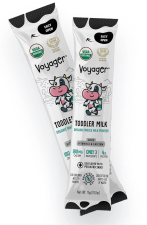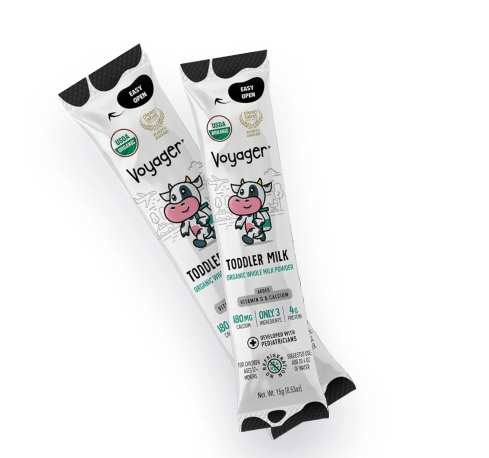
Organic Milk – Why It Matters and What’s Not Included in Certified Products
When it comes to toddlers, parents are often highly cautious about the food and drinks they offer their child. Milk, being a staple across households, is considered the prime food that supports a child’s developmental stages. There are different organic options that parents look for due to their transparent regulated modes of production.
Today, in our post, we will look at the core manufacturing processes of organic products and their labeling, which is ideal for parents. It helps them comprehend and make well-informed decisions, especially when the subject is about organic toddler milk.
What Does “Organic Milk” Really Mean?
Organic certification entails farming and production standards defined and accepted by authoritative bodies such as the USDA Organic/EU Organic programs. These authorities lay down how to rear animals, what their diet comprises, and the processing stages of their milk for each pouch of organic milk.
The objective of organic certification is to encourage responsible and balanced farming. Certified farms strive to keep the soil productive and the animals healthy and avoid the use of synthetic hormones, antibiotics, and pesticide residues. Milk produced for toddlers is meant to keep them aligned with clean, naturally derived nutrients that support steady early development and balanced cognitive growth.
Why Organic Milk Matters for Toddlers’ Development
Parents appreciate the nutritional aspects that milk offers to their toddlers. Various attributes define organically produced milk, contributing to a well-informed feeding preference that aligns with the toddler's developmental needs.
Supports Growing Bones
Calcium and vitamin D are essential elements given to toddlers as part of their daily nutrition since they help to develop their bones. Both organic and conventional milk offer these key nutrients; however, organic milk adheres to naturally produced sources.
It works as an assurance to the parents that their child's growth is promoted through mindful feeding.
Encourages Healthy Digestion
The digestive system of a toddler is still undergoing its developmental stage and is sensitive when introduced to new foods.
Organic milk might offer a smoother experience on young tummies through fewer external inputs. This enables kids to enjoy their mealtime with ease and comfort without any irritations.
Nurtures Brain and Nerve Development
Healthy fats, especially omega-3 and 6 fatty acids, play a critical role in helping with the brain development of toddlers.
Organic milk often portrays the right well-balanced nutrition that is sourced from naturally fed cows. It helps the parents in selecting a wholesome, supportive drink ideal for a child's growing mind.
Supports Immune Strength
The toddler years are vital to build your child's strength. Milk produced through the organic standards emphasizes purity and safety, following careful methods of production.
This allows parents to stay confident that their toddlers are getting the right nourishment from a reliable and mindful source.
Builds Healthy Habits Early
Toddlers often learn through their daily experiences. This includes everything that they eat and drink. Selecting milk from organically produced sources introduces toddlers to a mindful, conscious nutrition pattern that values the rhythms of nature, supporting a well-balanced approach.
Along with other items in the Toddler Travel Essentials basket, families can also add organic milk to their nutrition, made convenient.
The Hidden Side: What’s Not in Certified Organic Milk
In comparison to what parents focus on in milk, what is left out is of little concern. With certified organic milk, parents can enjoy peace of mind, as some of the complexity and opacity found in conventional milk are removed.
No Synthetic Hormones (rBST/rBGH)
In certified organic milk, the use of synthetic hormones, such as rBST and rBGH, is not permitted. The method of milking such cows is more traditional, with the well-being of the animals and appropriate production cycles adhered to, rather than mechanized methods.
No Pesticide Residues
Organic milk comes from cows that graze on forage and feed that have been organically grown free from chronic and synthetic pesticides. This not only restores the ecosystem and soil health, but also enhances parents’ confidence that the milk is produced in farms that practice proper, holistic, and ecological stewardship.
No Preventive Antibiotics
Organic certifications often outline protocols for veterinary care and limit the use of preventive antibiotics. The producers often record every treatment for an inspection review. Whenever animals need care, milk handling follows appropriate separation and testing processes well-defined by the certification programs.
No GMOs in Feed
There is no GMO-certified organic feed, so the milk is produced from cows that are organically fed and raised. This also proves that sensible and sustainable farming practices are upheld.
No Harsh Additives in The Processing Stages
For most organic milk products, processing additives such as stabilizers and unnecessary processing steps are avoided. Parents appreciate this because it helps in preserving the composition of the milk. It is also much cleaner and a more authentic aide for toddlers.
Conclusion
Understanding how milk is produced helps parents make thoughtful decisions about the milk that is appropriate for the family. Many families do not realize the amount of care put into responsible dairy production, which is why exploring different types of milk and the certified organic option is essential.
Voyager Milk provides parents and the public with practical, helpful information on the processes, sustainability, and sourcing of organic milk. If you plan to learn more about our verified organic milk, then contact us to understand how mindful production practices connect to the everyday nourishment of your toddler!
Frequently Asked Questions
1. How is organic toddler milk different in sourcing?
Organic toddler milk comes from farms that comply with certified practices for ethical animal treatment and soil stewardship, controlled feed, and proven non-synthetic procedures.
2. Which storage methods help preserve the quality of organic milk?
Maintain consistently cold temperature storage. Frequent temperature changes negatively impact the freshness and the organic formulation.
3. Can organic milk be used in toddler recipes?
As recommended by dietary guidelines, organic milk can be added to cereals, smoothies, and toddler meals.
4. How often are organic farms inspected for compliance?
Organic and certified farms are subject to annual inspections and paperwork to ensure compliance with organic production methods.


